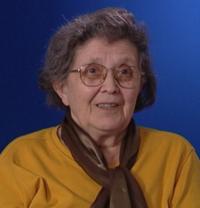Our children wouldn’t probably believe what was going on back then because these days freedom is more than anything, but at that time, they treated us just like we were things that belonged to them and they could do with us whatever they wanted
Dorota Kravjanská was born on April 21, 1929, in the village of Ťahanovce near Košice as the oldest child of her parents. She had six siblings. She grew up in the Christian family in the area with a large Jewish community. As a child she witnessed Aryanization along with deportations of Jewish population and the Second World War. Her father, a notary, got in disgrace with the State Security after the war because he had worked as a civil servant during the preceding regime. After the communist takeover when the religious freedom was restricted, Dorota became a member of many secret Christian communities (prayer groups). She also got involved into the Catholic Action thanks to which she met a lot of important people, for example Vladimír Jukl, Silvester Krčméry, doctor Altman, and many others. In 1954 the State Security got interested in Dorota’s personal life because of her activities within the Catholic associations. In September they detained her and transported her to Prešov prison where she experienced humiliation and enormous mental pressure. She was tried in October 1954. The court found her guilty of the offence of “consorting against the state” and sentenced her to one and a half year of imprisonment. She was also deprived of her civil rights for three years. As she was mother of a little child, she spent only one week in the prison, subsequently she was granted an amnesty and released. Even though she was free, Dorota’s life still remained full of insecurity and fear of the following reprisals; however, it didn’t discourage her to lead Christian life again. Together with her husband they brought up five children.

